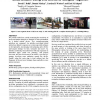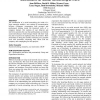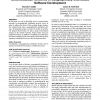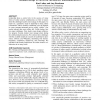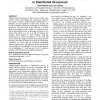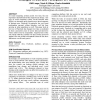116
Voted
CSCW
2008
ACM
15 years 4 months ago
2008
ACM
We extend the notion of social tagging to construct social summaries of complex multimedia materials. Our system allows students to apply time-indexed multimedia tags such as hand...
101
Voted
CSCW
2008
ACM
15 years 4 months ago
2008
ACM
We present results from a study examining the sensitivity of group navigation strategies to changes in route presentation on a shared mobile device. Two content-equivalent interfa...
104
click to vote
CSCW
2008
ACM
15 years 4 months ago
2008
ACM
A proliferation of mobile devices in everyday life has increased the likelihood of technologically mediated interruptions. We examine ethnographic data from an SMSbased pervasive ...
CSCW
2008
ACM
15 years 4 months ago
2008
ACM
108
Voted
CSCW
2008
ACM
15 years 4 months ago
2008
ACM
In this paper, we seek to shed light on how communication networks in geographically distributed projects evolve in order to address the limits of the modular design strategy. We ...
109
Voted
CSCW
2008
ACM
15 years 4 months ago
2008
ACM
Leadership plays a central role in the success of many forms of online creative collaboration, yet little is known about the challenges leaders must manage. In this paper, we repo...
105
Voted
CSCW
2008
ACM
15 years 4 months ago
2008
ACM
Tightly-coupled interaction is shared work in which each person's actions immediately and continuously influence the actions of others. Tightly-coupled collaboration is a hal...
121
Voted
CSCW
2008
ACM
15 years 4 months ago
2008
ACM
As social computing systems persist over time, the user experiences and interactions they support may change. One type of social computing system, Social Network Sites (SNSs), are...
121
Voted
CSCW
2008
ACM
15 years 4 months ago
2008
ACM
This article presents a rational model developed under the distributed cognition framework that explains how social tags influence knowledge acquisition and adaptation in explorat...
121
Voted
DFKI
2005
Springer
15 years 4 months ago
2005
Springer
It is widely accepted in Distributed Artificial Intelligence that a crucial property of artificial agents is their autonomy. Whereas agent autonomy enables features of agent-base...

